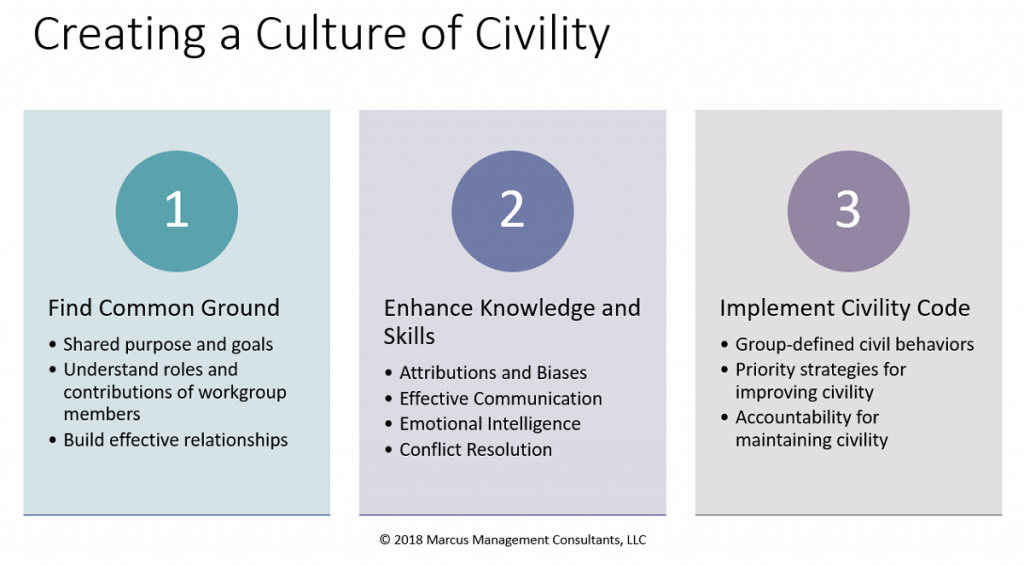
BUILD RESPECTFUL WORKPLACES
Issues that stem from antagonism among employees – ranging from personality clashes to employee harassment and EEOC complaints – can greatly hinder a company’s ability to get work done and lead to a toxic work culture and unhappy employees. Workplaces lacking civility and respect experience higher turnover, lower productivity, and increased legal and human resource costs.
Workplace civility is behavior that helps to establish norms for mutual respect at work. It comprises behaviors that are fundamental to positively connecting with one another by building relationships and empathizing with others. A civil work environment can improve a team’s productivity, collaboration, and appreciation of diversity so less time is devoted to dealing with interpersonal conflicts. Furthermore, a civil workplace culture will help companies prevent harassment, stem the tide of turnover, increase employee satisfaction and performance, and enhance overall organizational outcomes.
So how do you build a respectful workplace culture?
- Step 1: Assess the Workplace Culture
- Step 2: Provide employees the necessary information and tools
- Step 3: Implement a Code of Civility and Respect
- Step 4: Evaluate and evolve to meet your business and workforce needs
Our solutions include:
Assess the Workplace Culture
We’ve developed and validated the Multifactor Assessment of Civility™ (MAC) that helps pinpoint exactly where your problems exist. The MAC™ assesses workplace civility perceptions among functional workgroups or work teams. The MAC™ is comprised of five factors of workplace civility: Coworker Civility, Individual Civility, Supervisor Civility, Work Environment Civility, and Civil Communication. The MAC™ contains 30 items and takes about five minutes to complete. As seen in the Technical Manual, the MAC™ has been validated on over 1000 employees and has ample evidence of reliability and validity.
Improving workplace civility has major positive implications for organizations, such as increased job satisfaction, organization commitment, trust in management, and organizational savings. Higher levels of civility can also help to reduce turnover intentions, absenteeism, and EEO complaints.
Results from the MAC™ are used to design customized solutions to address workgroups with low civility. These interventions can include focused steps such as individual coaching, leadership development, organizational change strategies, and team building.
The MAC™ can be used in organizations of any size, including employees at various supervisory and non-supervisory levels.
Solutions to Build Respectful Workplaces
By providing the necessary information and tools, we empower individuals and teams to establish new civil norms; model desired behaviors; and confidently address potential future violations through an employee defined and owned Code of Civility and Respect.
Our customized solutions include:
Individual Coaching
- One on one coaching to enhance development of skills to lead and participate in respectful teams and organizations
Harassment Prevention and Civility Awareness Training (1/2 Day Workshop)
- Customized to review your harassment policies and procedures
- Understand the impact of civil behavior in preventing harassment & promoting inclusion
- Define behaviors that promote civility and respect for the organization
Civility and Respect Skill Building Workshops (Full Day Workshop)
- Builds on our half day training with a deeper dive into the skills that facilitate creating and maintaining a civil workplace
Enhancing Team Civility Boot Camp
- Intensive multi-session training for a team with low civility scores
- We have developed a 3-step model to Create a Culture of Civility within your teams:

- Boot camp format is interactive and consists of education and skill building activities inside and outside of each session designed to increase the team’s capacity to interact respectfully, resolve conflicts, and work as an effective team
- Teams define behaviors that promote civility and respect; identify priority strategies for improving civility; and hold each other accountable for maintaining a respectful workplace
- Bootcamps may be offered face to face or in a blended format of face to face and virtual meetings
